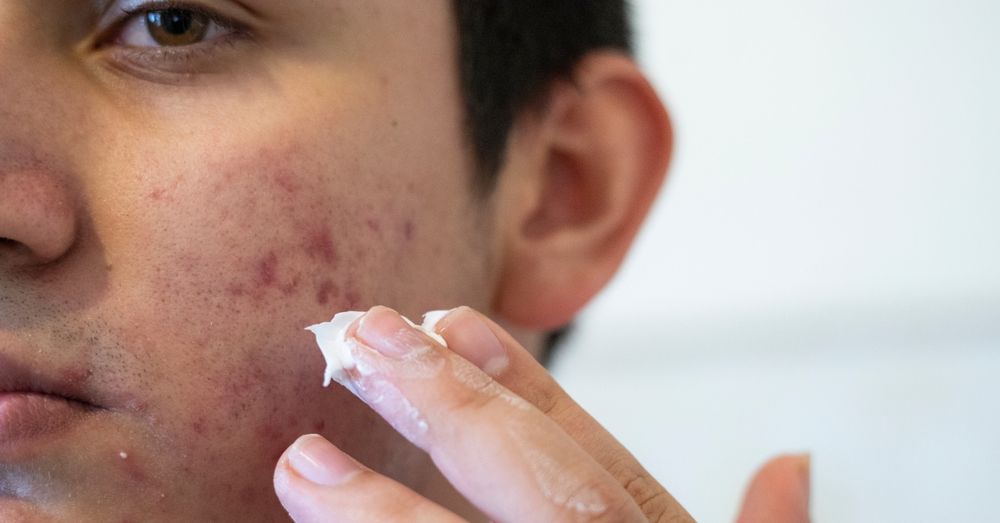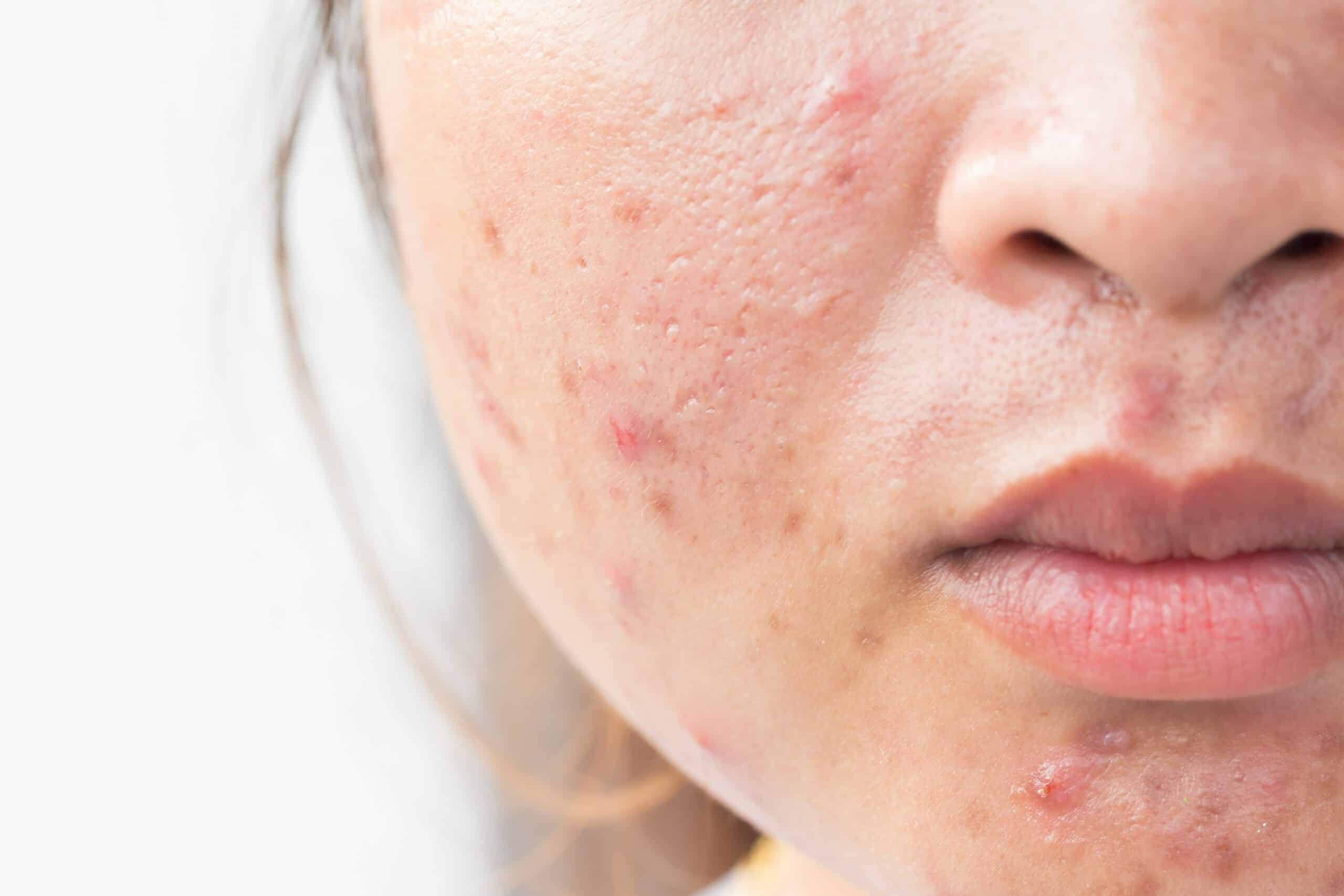The best way to remove acne marks is through a combination of exfoliation, topical treatments, and professional dermatological procedures. Consistency and skin care hygiene are key for effective results.
Acne marks can be a frustrating reminder of past breakouts and can affect one’s self-esteem. To combat these persistent blemishes, adopting a comprehensive skincare routine is essential. Starting with gentle exfoliation helps to shed dead skin cells and promote new cell growth.
Topical treatments, such as those containing retinoids or vitamin C, can significantly improve skin texture and reduce discoloration. For stubborn acne scars, professional treatments like chemical peels, microdermabrasion, or laser therapy might be necessary. It’s important to remember that these methods require time to show results. Maintaining a healthy diet and keeping the skin clean also supports the healing process. Always consult with a dermatologist before starting any new treatment, especially for those with sensitive skin. With dedication and the right approach, clearer skin can be achieved.
Introduction To Acne Marks
Acne marks are like uninvited guests that linger on your skin. They are reminders of the pimples and breakouts that once were. Knowing the best ways to remove these marks can restore your skin’s clarity. Let’s delve into the battle against these stubborn scars and explore the types that might be affecting you.
The Battle With Blemishes
Blemishes come in many forms, each requiring a unique approach to heal. Bold action against acne marks involves a combination of skincare routines and treatments. Patience is key, as the process can take time.
Types Of Acne Scars
Acne scars vary widely, and understanding them is the first step to effective treatment. There are two main types:
- Atrophic scars – These appear as small indentations in the skin.
- Hypertrophic scars – These are raised and stand above the skin’s surface.
Skin Healing Fundamentals
Battling acne marks requires understanding skin repair basics. To achieve a clear complexion, we must promote our skin’s natural healing processes. Effective acne mark removal intertwines with skin health and resilience. Here’s a deep dive into the fundamentals that can help fade those stubborn scars.
Role Of Collagen In Skin Repair
Collagen acts as the skin’s support structure. It’s crucial for repairing damaged skin and smoothing acne scars. When acne wounds heal, the body produces collagen. If too little or too much collagen is made, scars become noticeable.
- Eat foods rich in Vitamin C to boost collagen.
- Use retinol creams to stimulate collagen production.
- Avoid direct sunlight that can break down collagen.
Importance Of Skin Hydration
Keeping skin hydrated is essential for scar healing. Moisture helps skin remain flexible and allows new cells to form smoothly. Dry skin can make acne marks more pronounced.
Drink plenty of water daily for internal hydration. Apply hydrating serums with hyaluronic acid to lock in moisture.
Don’t forget to use a gentle, non-comedogenic moisturizer to maintain surface hydration without causing breakouts.
Topical Treatments
Topical treatments offer a powerful way to reduce acne marks. They target the skin’s surface directly. This makes them effective for healing and rejuvenation. Let’s explore the top agents in topical treatments for acne marks.
Retinoids: Skin Renewal Agents
Retinoids speed up cell turnover. They replace damaged cells with fresh skin. Over time, retinoids can fade acne marks. They also improve skin texture. Use retinoids at night. They make skin sensitive to the sun.
Vitamin C: Brightening And Repair
Vitamin C is known for its brightening properties. It helps in repairing the skin. Vitamin C also reduces redness. It boosts collagen production. This helps in healing acne marks.
Ahas And Bhas: Exfoliating Acids
- AHAs (Alpha Hydroxy Acids) remove dead skin cells.
- They reveal fresh skin underneath.
- BHAs (Beta Hydroxy Acids) penetrate deep into the pores.
- BHAs clear out excess oils and prevent acne.
Both AHAs and BHAs exfoliate the skin. Regular use can lead to smoother and clearer skin.

Credit: manmatters.com
Professional Dermatological Procedures
Professional Dermatological Procedures offer advanced solutions for those seeking to erase acne marks. These treatments, performed by skilled dermatologists, can significantly improve skin’s appearance. Tailored to individual skin types and concerns, these options promise a clearer complexion. Let’s dive into the top professional procedures.
Chemical Peels: Accelerated Exfoliation
Chemical peels use acids to remove the outermost skin layers. This process reveals fresh, smooth skin beneath. Peels vary in strength and are selected based on skin condition and desired results. Here are the benefits:
- Reduce acne marks and scars
- Promote even skin tone and texture
- Stimulate new cell growth for a youthful look
Laser Therapy: Precision Scar Removal
Laser therapy targets scar tissue with concentrated light beams. This stimulates healing and collagen production. Different lasers cater to various scar types and skin tones. Key advantages include:
- Minimize skin damage with precise treatment
- Improve skin texture and clarity
- Customizable to individual needs
Microneedling: Collagen Induction Therapy
Microneedling involves tiny needles that create micro-injuries in the skin. This process kickstarts the body’s natural healing. It boosts collagen and elastin production. Expect these outcomes:
- Diminish acne marks effectively
- Enhance skin firmness and elasticity
- Safe for all skin types, with minimal downtime
Natural Remedies And Diy Solutions
Scars from acne can be stubborn, but nature offers solutions that are gentle and effective. Natural remedies and DIY solutions can help fade these marks. They use ingredients that may already be in your home. Let’s explore how you can use these natural healers to restore your skin’s beauty.
Aloe Vera: Nature’s Healer
Aloe vera is known for its soothing properties. It aids in skin regeneration and has anti-inflammatory benefits. This makes it an excellent choice for reducing acne scars.
- Cut an aloe vera leaf and squeeze out the fresh gel.
- Apply the gel to your acne marks.
- Leave it on for about 30 minutes, then rinse.
For best results, repeat this process daily. You should see your scars become less visible over time.
Essential Oils: Nature’s Potent Extracts
Essential oils are concentrated plant extracts. They can promote healing and reduce the appearance of acne scars.
| Essential Oil | Benefits | How to Use |
|---|---|---|
| Lavender | Reduces redness and helps in skin renewal. | Mix with a carrier oil and dab on scars before bed. |
| Tea Tree | Has antiseptic properties that prevent acne. | Apply diluted oil with a cotton swab twice a day. |
| Rosehip | Rich in vitamins and antioxidants for skin health. | Massage a few drops on scars each night. |
Always dilute essential oils with a carrier oil like jojoba or coconut oil. This prevents irritation. Perform a patch test to ensure you’re not allergic to the oils.

Credit: qaziclinic.com
Lifestyle Adjustments For Clear Skin
Lifestyle adjustments are key to not only maintain overall health but also to achieve clear skin. Simple changes in your daily routine can make a significant difference. By focusing on diet and stress levels, you can help reduce acne marks and improve your skin’s appearance. Let’s explore some effective lifestyle strategies.
Dietary Changes For Skin Health
Eating the right foods is crucial for skin health. Certain foods can help your skin heal and prevent acne marks.
- Increase vitamin-rich foods like fruits and vegetables.
- Avoid dairy and high-glycemic foods which can trigger acne.
- Stay hydrated by drinking plenty of water.
Consider a balanced diet that includes healthy fats, lean proteins, and whole grains. This can promote skin repair and reduce inflammation.
Stress Management And Skin Clarity
Stress can worsen skin conditions, including acne. Managing stress is vital for clear skin.
- Practice relaxation techniques like deep breathing or meditation.
- Get enough sleep to allow your skin to heal properly.
- Exercise regularly to reduce stress hormones in the body.
Setting aside time for hobbies and activities you enjoy can also help lower stress levels. Remember, a calm mind often means clearer skin.
Preventive Measures To Avoid Acne Scarring
Preventive Measures to Avoid Acne Scarring can make a huge difference in the health of your skin. Taking steps early on to treat acne and protect your skin can save you from unwanted marks later in life. Learn how to keep your skin clear and scar-free with some effective strategies and protective measures.
Effective Acne Treatment Strategies
Starting with the right acne treatment is key to preventing scars. Treatments should target acne early and be consistent. Here are some strategies:
- Consult a dermatologist to find a treatment that works for you.
- Use topical treatments, like benzoyl peroxide or salicylic acid, to reduce inflammation.
- Never pick or squeeze pimples to avoid damaging the skin.
- Maintain a skin-care routine that includes gentle cleansing and moisturizing.
Sun Protection: A Critical Step
Protecting your skin from the sun is essential in preventing acne scars. UV rays can darken acne marks, making them more visible. Here’s how you can shield your skin:
- Wear sunscreen with an SPF of 30 or higher every day, even if it’s cloudy.
- Reapply sunscreen every two hours, or more often if swimming or sweating.
- Seek shade during peak sun hours, between 10 a.m. and 4 p.m.
- Wear protective clothing, such as hats and long sleeves, when outdoors.
Understanding Skin Types And Treatments
Removing acne marks is a common skin care challenge. Each skin type reacts differently to treatment options. It’s crucial to identify your skin type and understand how it responds to various treatments. This ensures the best approach for clear, healthy-looking skin. A tailored plan can address acne scars effectively. Let’s delve into customizing solutions for diverse skin types.
Tailoring Solutions To Your Skin
Not all skin is the same. Here’s a quick guide to help you find the right solution:
- Normal Skin: Tolerates a variety of treatments; gentle exfoliation and lightening creams can be effective.
- Oily Skin: Prefers gel-based products; avoid heavy creams.
- Dry Skin: Needs extra hydration; look for nourishing treatments that contain hyaluronic acid.
- Combination Skin: May need a combination of products to target different areas.
Sensitive Skin Considerations
Sensitive skin requires special care. Avoid harsh chemicals and fragrances. Opt for hypoallergenic and non-comedogenic products. Perform a patch test before applying any new treatment. Here are some sensitive skin-friendly options:
| Treatment Type | Benefits |
|---|---|
| Aloe Vera | Heals and soothes the skin |
| Niacinamide | Reduces redness and hyperpigmentation |
| Centella Asiatica | Promotes collagen production and skin healing |
When To See A Dermatologist
Struggling with acne marks can be frustrating. Sometimes home remedies and over-the-counter treatments don’t do the trick. Knowing when to seek professional help is crucial for your skin’s health. Let’s explore the signs that indicate it’s time to book an appointment with a dermatologist.
Persistent Acne Marks
If you notice that your acne marks aren’t fading over time, it could be a sign to get expert advice. Stubborn scars need special attention. A dermatologist can offer treatments like chemical peels or laser therapy.
- Dark spots lasting longer than a few months
- Scarring that seems to be getting worse
- Discoloration that affects self-esteem
Professional Guidance For Severe Cases
Severe acne scarring can be difficult to manage. In such cases, a dermatologist can provide customized treatment plans. These may include:
| Treatment Type | Description | Expected Results |
|---|---|---|
| Microdermabrasion | Gentle exfoliation to remove the outer layer of skin. | Smooth, rejuvenated skin. |
| Fillers | Substances like hyaluronic acid injected under the skin. | Reduced appearance of deep scars. |
| Prescription Medications | Topicals or oral medications to address underlying issues. | Clearer skin with reduced scarring. |
For personalized advice, visit a dermatologist. They can work with you to find the best solution for your skin.
Success Stories And User Testimonials
Everyone loves a good transformation story. Success Stories and User Testimonials shine a light on real people achieving clear skin. These stories are not just inspiring. They are proof that the battle against acne marks can be won. Meet individuals who have turned their skin woes into wows. Their journeys offer valuable insights into effective skincare routines.
Real-life Clear Skin Journeys
Real people, real stories, real results. The path to clear skin is unique for everyone. Here are a few remarkable transformations:
- Emma’s Victory: Emma struggled with acne scars for years. She discovered a regimen combining gentle exfoliation and vitamin C serum. Her skin transformed in months.
- Liam’s Turnaround: Liam faced severe post-acne hyperpigmentation. A tailored approach with retinol and sunscreen gave him his confidence back.
- Ava’s Breakthrough: Ava’s journey involved a balanced diet and targeted skincare. She now enjoys a blemish-free complexion.
Inspiration For Your Skincare Routine
These testimonials offer hope and direction for your skincare journey. Learn from others to create your own success story:
| Person | Challenge | Solution | Result |
|---|---|---|---|
| Noah | Oily skin with acne marks | Oil-free moisturizers and weekly clay masks | Matte, clear skin in 10 weeks |
| Isabella | Red acne scars | Niacinamide serum and aloe vera gel | Even skin tone after 12 weeks |
Conclusion: Embracing Your Skin Journey
Acne marks can be stubborn, but so can you. The quest for clear skin is a personal journey, one that requires patience, consistency, and the right approach. It’s not just about the products you use, but also about how you view your skin. Love and acceptance go a long way in transforming your skin and self-confidence.
The Road To Confidence
Building confidence takes time. Seeing your skin improve brings a sense of achievement. Remember, each small step counts. Your skin’s healing process mirrors your own growth—steady, resilient, and evolving. Celebrate every victory, tiny or significant, on your path to clear skin.
Staying Committed To Clear Skin
- Set a routine and stick to it daily.
- Choose treatments that suit your skin type.
- Track your progress and adjust as needed.
- Stay hydrated and eat a balanced diet.
- Consult with a dermatologist for personalized advice.
Maintaining clear skin is a lifelong commitment. Your efforts will pay off as you find the best ways to remove acne marks that work for you. Trust the process, and your skin will reflect your dedication.

Credit: www.reequil.com
Frequently Asked Questions
How Can I Get Rid Of Acne Marks Fast?
To quickly diminish acne marks, use topical treatments like retinoids or vitamin C, undergo professional chemical peels or microdermabrasion, and protect skin with SPF daily. Always consult a dermatologist for personalized care.
Can Acne Marks Be Removed Completely?
Acne marks can often be significantly reduced or removed with treatments like laser therapy, chemical peels, and topical products. Consistent skincare routines and professional interventions yield the best results.
Can You 100% Remove Acne Scars?
Completely removing acne scars may not be possible, but treatments can significantly reduce their appearance. Dermatological procedures like laser therapy, microneedling, and chemical peels offer improvement. Consult a skincare specialist for personalized advice.
How To Get Rid Of Acne Dark Spots?
To eliminate acne dark spots, use topical treatments like retinoids or vitamin C, apply sunscreen daily, try chemical peels or laser therapy, and maintain a consistent skincare routine. Always consult a dermatologist for personalized advice.
Conclusion
Banishing acne marks can be a journey, but it’s one worth taking for clear skin. We’ve explored effective treatments that promise smoother, blemish-free results. Remember, consistency is key—choose a method that resonates with your skin type and stick with it.
Here’s to unveiling your best complexion yet!

